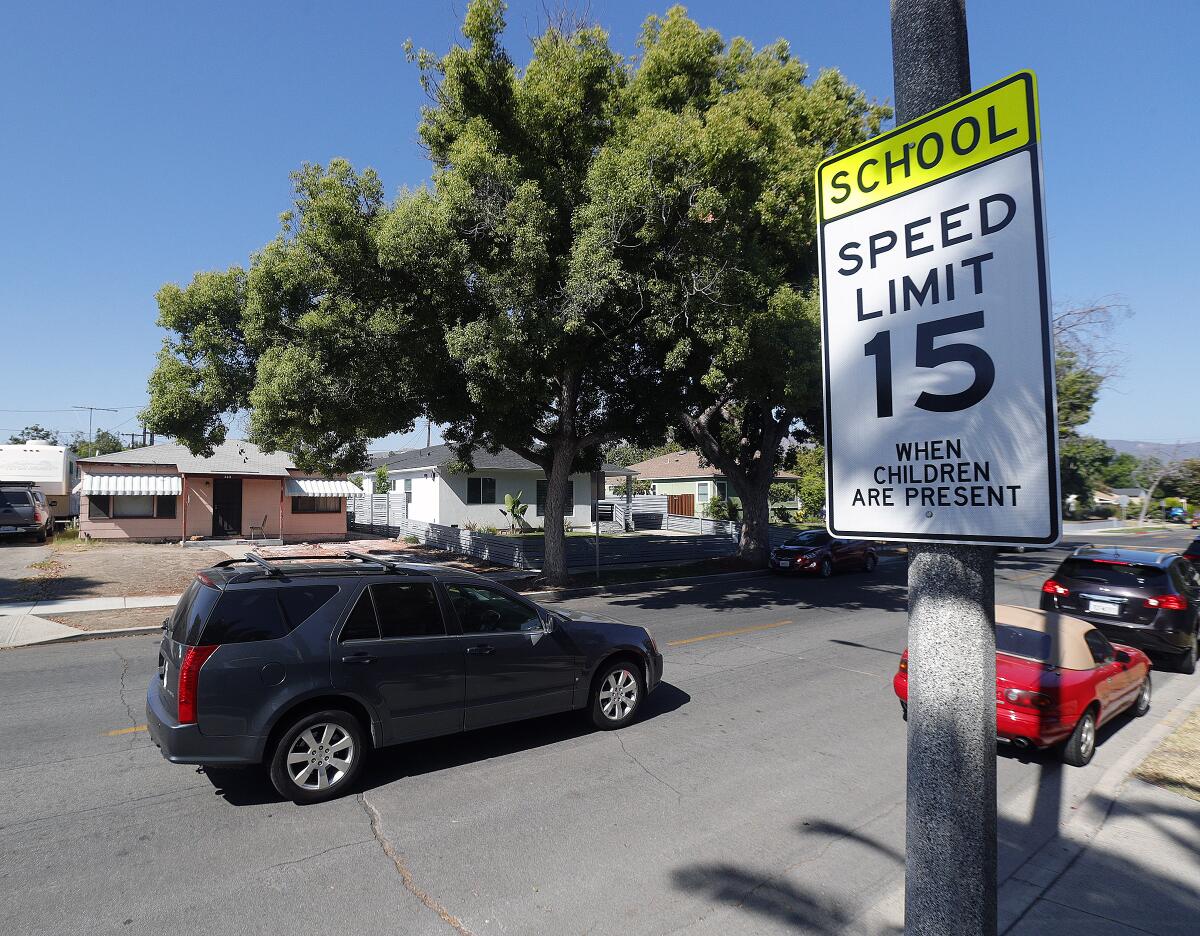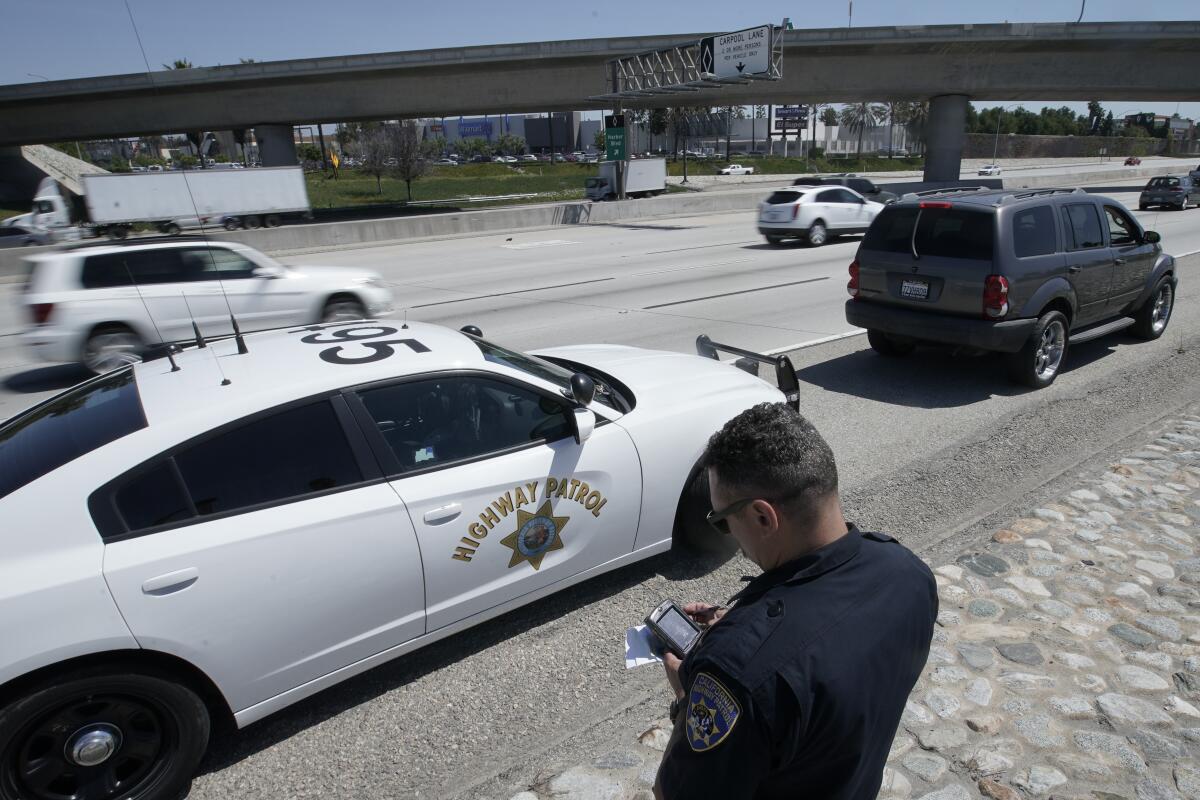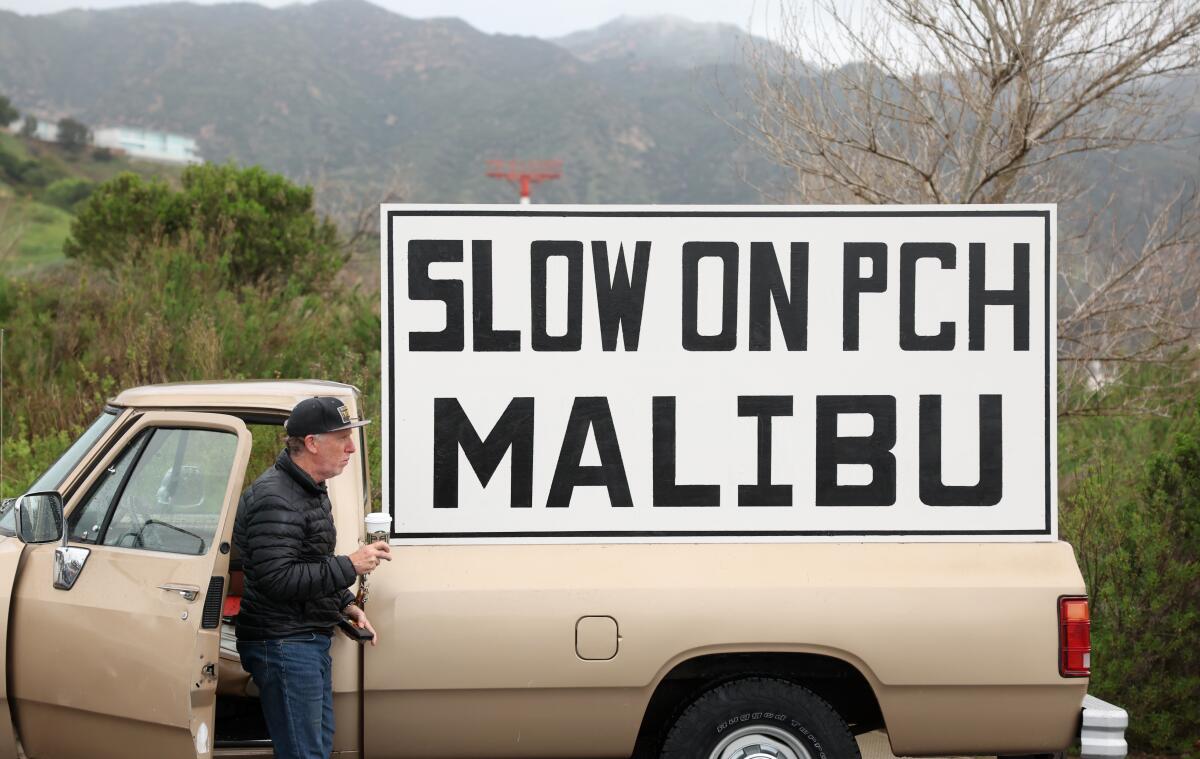Lifesaver or freedom killer? Gov. Newsom will decide if new cars give speed alerts

- Share via
Good morning. It’s Thursday, Sept. 5. Here’s what you need to know to start your day.
- A state bill passed last week would require new cars to come equipped with technology that warns drivers going 10 mph above the speed limit.
- Worst of dangerous SoCal heat wave hitting over next few days: What to know.
- 12 must-try dishes that celebrate L.A.’s vibrant Salvadoran food scene.
- And here’s today’s e-newspaper
You're reading the Essential California newsletter
Our reporters guide you through our biggest news, features and recommendations every morning
You may occasionally receive promotional content from the Los Angeles Times.
Lifesaver or freedom killer? Gov. Newsom will decide if new cars give speed alerts
Imagine you’re running an errand in your car when you hear a beep. You glance at your dash display and see that you’re exceeding the speed limit. Do you ease off the gas pedal or just ignore the warning and keep speeding?
More California drivers could face that choice if Gov. Gavin Newsom signs a bill state lawmakers passed last week. Senate Bill 961 requires that new cars and trucks come equipped with a warning system alerting drivers any time they travel more than 10 miles over the speed limit.
“This would mark the first law of its kind in the U.S. and would rely on existing ‘intelligent speed adaptation’ technology to try to curtail traffic fatalities and injuries,” my colleague Colleen Shalby reported this week.
The bill would mandate the technology, also called intelligent speed assistance (ISA), in new vehicles sold in the state by 2030. Several vehicle types would be exempt, including emergency vehicles, motorcycles and cars that already have built-in GPS or a front-facing camera.
State Sen. Scott Wiener (D-San Francisco), who authored the bill, said it’s one part of a broader effort to curb traffic violence, which has been surging in California.

Over the last five years, more than 18,700 people died in traffic crashes, according to state data compiled by researchers at UC Berkeley. Tens of thousands more were seriously injured. Speed-related crashes account for nearly a third of traffic deaths across the nation each year.
“It doesn’t have to be this way,” Wiener told me this week. “We know how to make our roads safer.”
Iterations of the technology have been around for years. Maybe you’ve noticed speed limits displayed when you’re using Google or Apple’s navigation apps. Waze has a feature for users to set up speeding alerts. Toyota is including the technology in all its new models next year. As of July, all new cars sold in European Union countries are required to have ISA technology.
The bill also ignited yet another ideological battle between those championing individual freedom and those advocating for collective public safety. So let’s unpack it.
From speed governors to passive warnings
Wiener’s initial bill called for mandated speed governors in new cars, which physically hinder a vehicle from going more than 10 mph over a posted speed limit.
But shocker: A policy that would force drivers to slow down — especially in California — was not popular. Wiener said it quickly became clear his bill would not gain momentum, so he opted for a “lighter touch.”
His amended bill describes the alert as a “brief, one-time visual and audio signal” that activates when a car exceeds the set threshold, rather than a constant beeping.
“It provides people with information instead of forcing them to stay below a certain speed,” Wiener said. He believes the alert will be enough to slow down most drivers, many of whom may not realize how fast they’re going — especially in newer cars that perform more quietly and smoothly.

Damian Kevitt, executive director of Streets Are for Everyone, is a longtime safety advocate based in Los Angeles who co-sponsored the legislation. He and fellow supporters worry that Newsom will veto the bill because of pressure from the auto industry, which he noted has a long track record of opposing safety regulations.
“As soon as you have a single state that starts doing this, the automobile industry is going to be pushing to get federal legislation,” he said. “We’re really looking at something that would help improve [safety] across the entire U.S.”
Why the auto industry and Republican lawmakers oppose the bill
The Alliance for Automotive Innovation, composed of major automakers, vehicle component suppliers and other auto industry players, opposes SB 961, contending that it should be left to the federal government to decide.
“Automakers developed technologies like intelligent speed assist to help improve roadway safety, but the right forum to debate new vehicle technology requirements is with the federal regulator,” an alliance spokesperson said in a statement. “We can’t have 50 states setting 50 competing sets of vehicle technology and safety rules.”
That regulator is the National Highway Traffic Safety Administration, or NHTSA, which is known to move slowly in implementing vehicle safety rules. On the agency’s website, officials note that intelligent speed assistance “has been found to lower speeding among drivers using the systems,” citing research in Europe and the U.S. from a decade ago.
“Based on relationships between speed and safety, substantial crash savings are expected,” the agency wrote. But NHTSA has not yet started on any regulatory framework.
In an email, an agency spokesperson said NHTSA has proposed adding ISA to its 5-Star Safety Ratings program and is “initiating new research this year … specifically focusing on ISA capabilities and limitations, as well as consumer acceptance of the technology.”
The bill did not receive any Republican support, with some members in the Senate and Assembly contending that the state should leave the decision to NHTSA.
But they made other arguments against the safety feature, including:
- “It just adds one more thing for us to worry about.”
- “The last thing I need is my car beeping at me.”
- “People are going to become annoyed and irritated and they’re not going to change their behavior.”
GOP lawmakers also cited concerns about what it would cost car buyers if technology became mandated in new cars. And there was the common accusation levied in the face of many proposed government regulations: that requiring the technology would be an assault on personal freedom.
“This is just another step towards making California a nanny state,” Assemblymember James Gallagher (R-Yuba City) said. “This bill is about control. It’s not about safety.”
Let’s check some of those arguments
First, audible alerts in cars are not some strange new thing. Many cars let us know if our seat belts aren’t fastened or if our door is ajar or if we’re too close to an object while backing up. These features are designed to encourage safer behavior and avoid collisions.
As for the claim that safety regulations are freedom killers, it’s worth noting that similar arguments were made when regulators moved to require seat belts and airbags in new cars — and when states began to crack down on drunk driving.
We know seat belts and airbags save lives. Criminalizing drunk driving saves lives. Safety advocates say the research is clear that this feature will do the same.
“There’s freedom, but there’s also the right to live,” Kevitt said. “Right now, dangerous driving is costing people that freedom.”
And although some lawmakers cited concerns about the financial consequences for consumers, there’s another cost that didn’t come up. Traffic violence is estimated to cost Californians over $29 billion annually in the form of medical expenses, property damage, lost productivity, insurance payouts and more. That’s according to a NHTSA report from 2019.
To be clear: There’s no single magic bullet that will stop people from driving dangerously and hurting or killing others with their cars. Traffic safety experts say it’ll take dramatic shifts in street design, enforcement and vehicle regulations to meaningfully reduce the carnage on our roads. I’ve explored some of those efforts in previous editions of this newsletter:
- A preschooler’s death, delayed improvements, a $9.5-million settlement: The true cost of L.A.’s traffic safety failures
- There’s a lot more we could be doing to make streets safer. Here are several examples
- When it comes to deadly streets, should we blame drivers less and design more?
Today’s top stories

‘Defund police’ or reimagine safety? Kamala Harris’ record on a historic American issue
- Does Vice President Kamala Harris support “defunding” police? A cluster of interviews from 2020 provides a unique window into her worldview.
- Meanwhile in California, the Democratic-controlled Legislature passed a set of stringent crime bills, marking a significant change in its approach to criminal justice reform compared with previous years.
Southern California braces for the worst of this week’s dangerous heat wave
- Most of Los Angeles County — where temperatures could reach 95 to 110 degrees — is under an excessive heat warning until 8 p.m. Friday. In the San Fernando Valley, temperatures could climb to 115 degrees.
- Hundreds of cooling centers and “climate stations” will be open throughout Los Angeles, providing shade, seating and cold beverages for people who need relief from the heat.
- Meanwhile, high heat and high levels of bacteria spell trouble at these L.A. County beaches.
Landslides bring uncertainty and fear to Rancho Palos Verdes
- Unpredictable and accelerated land movement prompted power shutoffs in Rancho Palos Verdes. Faced with continued uncertainty residents struggle with solutions to stay in their homes.
- Newsom this week declared a state of emergency for Rancho Palos Verdes, where land movement under the city “is now sliding at an average of 9 to 12 inches per week.”
Did authorities have to kill a Malibu puma who attacked a boy?
- After a mountain lion attacked a 5-year-old boy over the weekend, some commenters on social media criticized officials’ decision to kill the big cat and accused the boy’s family of provoking the animal.
- But experts said that the killing of the puma was probably the only responsible answer. “We don’t have mountain lion jail,” said the California regional executive director of the National Wildlife Federation.
More big stories
- Two fires, fueled by heat and dry winds, inch toward communities in Sierra and Fresno counties.
- A violent sexual predator once known as the “Pillowcase Rapist” is set to be released and could be making his home in Los Angeles County.
- “October 7,” a play drawn from interviews with survivors of Hamas’ 2023 terror attack on Israel, will make its West Coast premiere via a staged reading at UCLA next month.
- A raid found an illegal weed operation in a home owned by an Oakland police officer.
Get unlimited access to the Los Angeles Times. Subscribe here.
Commentary and opinions
- Trump’s hapless and contradictory flailing on abortion is a prime signal: This man shouldn’t get another term, Jackie Calmes writes.
- Trump’s remarks about school transgender policies are his most unhinged and despicable yet, Michael Hiltzik writes.
- Harris’ appealing but ineffective economic policy proposals, and all those flip-flops, may be her downfall for swing voters, Lanhee J. Chen writes.
- Robin Abcarian looks at the incredibly long list of musicians who have demanded that Trump stop using their songs.
- Towing RVs without offering help only leaves more people living on the street, The Times’ Editorial Board argues.
Today’s great read
The Mexican Mafia Tapes: How an informant nearly brokered a cartel alliance. Ralph Rocha infiltrated negotiations between the Mexican Mafia and a cartel for the ATF. His handlers didn’t know he made secret tapes that would jeopardize the case.
How can we make this newsletter more useful? Send comments to essentialcalifornia@latimes.com.
For your downtime

Going out
- 🍴 Here are 12 must-try dishes that celebrate L.A.’s vibrant Salvadoran food scene.
- 🏈 Want to attend a Big Ten football game? Here’s a guide to all 18 stadiums.
- 💀 Despite its charm, “Beetlejuice Beetlejuice” shouldn’t have been summoned, critic Katie Walsh writes.
- 🇹🇷 L.A.’s best Turkish cooking can be found at this coffee shop’s kebab pop-up.
Staying in
- 🥊 “Fight Night: The Million Dollar Heist,” premiering today on Peacock, focuses on an infamous crime that took place on the same night as Muhammad Ali’s historic 1970 comeback fight in Atlanta.
- 📺 “K-Pop Idols,” a new docuseries on Apple TV+, captures the pitfalls and triumphs of a secretive industry.
- 🧑🍳 Here’s a recipe for oven-baked chicken tenders with celery and grape salad.
- ✏️ Get our free daily crossword puzzle, sudoku, word search and arcade games.
And finally ... from our archives
Jack Kerouac’s “On the Road” was published on Sept. 5, 1957. The novel did not receive a glowing review from Los Angeles Times critic Robert R. Kirsch.
“Mr. Kerouac may one day be a good writer, but that day will come when he stops riding around in a compulsive search for ‘material’ and settles down to learn some of the first things about the craft,” Kirsch wrote on Oct. 4, 1957.
Have a great day, from the Essential California team
Ryan Fonseca, reporter
Defne Karabatur, fellow
Andrew J. Campa, Sunday reporter
Hunter Clauss, multiplatform editor
Christian Orozco, assistant editor
Stephanie Chavez, deputy metro editor
Karim Doumar, head of newsletters
Check our top stories, topics and the latest articles on latimes.com.
Sign up for Essential California
The most important California stories and recommendations in your inbox every morning.
You may occasionally receive promotional content from the Los Angeles Times.





